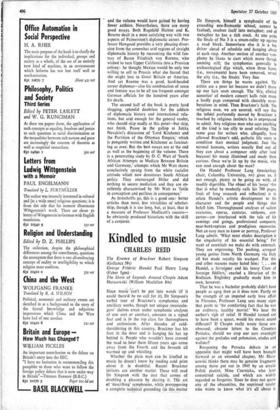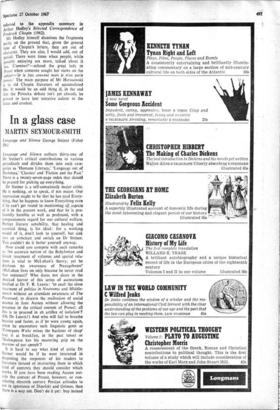Kindled to music
CHARLES REID
George Frideric Handel Paul Henry Lang (Faber 5gns)
The Skein of Legends Around Chopin Adam Harasowski (William Maclellan 84s) Since music 'can't be put into words (if it could there'd be no call for it), Dr Simpson's verbal tour of Bruckner's symphonies and ancillary works, though not unique (musicolo- gists' shelves creak under symphonic analyses of one sort or another), amounts to a signal feat and is in the top class for thoroughness and enthusiasm. After decades of cold- shouldering in this country, Bruckner has his foot in the door and is hanging his hat up behind it. People who wouldn't have crossed the road to hear them fifteen years ago come away from the Fourth and the Seventh all warmed up and whistling.
Whether the plain man can be kindled to music he doesn't know by reading cold print about it is doubtful. Recent Bruckner initiates are another matter. These will read Dr Simpson with the zest that comes of doubling a pleasure by sharing it. The art of 'describing' symphonies, while presupposing a complete technical grounding (in this matter
Dr Simpson, himself a symphonist of the crusading neo-Romantic school, cannot be faulted), resolves itself into metaphor; and of metaphor he has a rich stock. At one point the finale of No 3 is a steam-roller up against a road block. Somewhere else it is a bus driver ahead of schedule and hanging about at each stop. Another section of another sym. phony he likens to stars which move though seeming still; the symphonies generally to archaeological digs which, when three layers (i.e., movements) have been removed, reveal the city (i.e., the finale). Very fine.
There are things he warns against. lit critics are a poor lot because we didn't throw up our hats soon enough. The 'dry, clinical acoustics' of modern concert halls ruin many a lordly page composed with churchly rever- berations in mind. Then Bruckner's faith. The religious man, we are assured, will say that the infidel profoundly moved by Bruckner is touched by religious instincts he is unprepared to admit. Any religious man who says anything of the kind is too silly to need refuting. The same goes for writers who, allegedly, have allowed Bruckner's odd, pathetic life story to condition their musical judgment. Just like normal humans, writers usually find out all they can about a composer only after (and because) his music illumined and made them curious. Once we're lit up by the music, who can read enough about the man?
On Handel Professor Lang (musicology chair, Columbia University, NY) gives us, if not enough, plenty to be going on with, all readily digestible. The object of his 'essay' (for that is what he modestly calls his 700 pages, fruit of long research and reflection) is to relate Handel's artistic development to his character and the people and things that befell him. Thoroughpaced analyses of salient oratorios, operas, cantatas, anthems, con- certos—are interleaved with the tale of his comings and goings, professional conquests, near-bankruptcies and prodigious recoveries. Not an easy man to know or portray, Professor Lang admits. 'What most eludes description is the singularity of his essential being.' For want of essentials we make do with externals. They are engrossing. The pushing, arrogant young genius from North Germany via Italy all but made royalty his washpot. For this and other reasons many hated him: . . one Handel, a forreigner and his lowsy Crew of forreign fiddlers,' snarled a librarian of the Bodleian. Englishry gradually made him its own, however.
That he was a bachelor probably didn't have people as agog then as it does now. Partly on the strength of an imputed early love affair in Florence, Professor Lang sees many signs that point to 'the comforting fact that he was an ordinary, healthy mortal.' We hear the author's sigh of relief. If Handel turned out to have been a queer, would his music sound different? If Chopin really wrote those sex- obsessed, obscene letters to the Countess Potocka, should we stop our ears overnight against the preludes and polonaises, etudes and waltzes?
Reopening the Potocka debate in an appendix that might well have been brought forward as an extended chapter, Mr Hara- sowski thinks there may be genuine fragments among those put out in 1945 by an erratic Polish pianist, Mme Czernicka, who later committed suicide, and which are widely regarded as forgeries. Since he does not quote any of the obscenities, the unprimed reader who wants to know what it's all about is
referred to . the appendix summary in Arthur Hedley's Selected Correspondence of Frederyk Chopin (1962). Mr Hedley himself dismisses the fragments partly on the ground that, given the general tone of Chopin's letters, they are out of character. They are also, I would add, out of period. There were times when people, while possibly enjoying sex more, talked about it. less. 'L'amourr—echoed the great lady in Proust when someone sought her views on the subject-7e le fais souvent mais je teen pas-le jamais: The main purpose of Mr Harasowski is to rid Chopin literature of accumulated fibs. It would be an , odd thing if, in the end (for the Potocka debate isn't yet closed), he proved to have lent tentative colour to the latest and crudest.











































 Previous page
Previous page